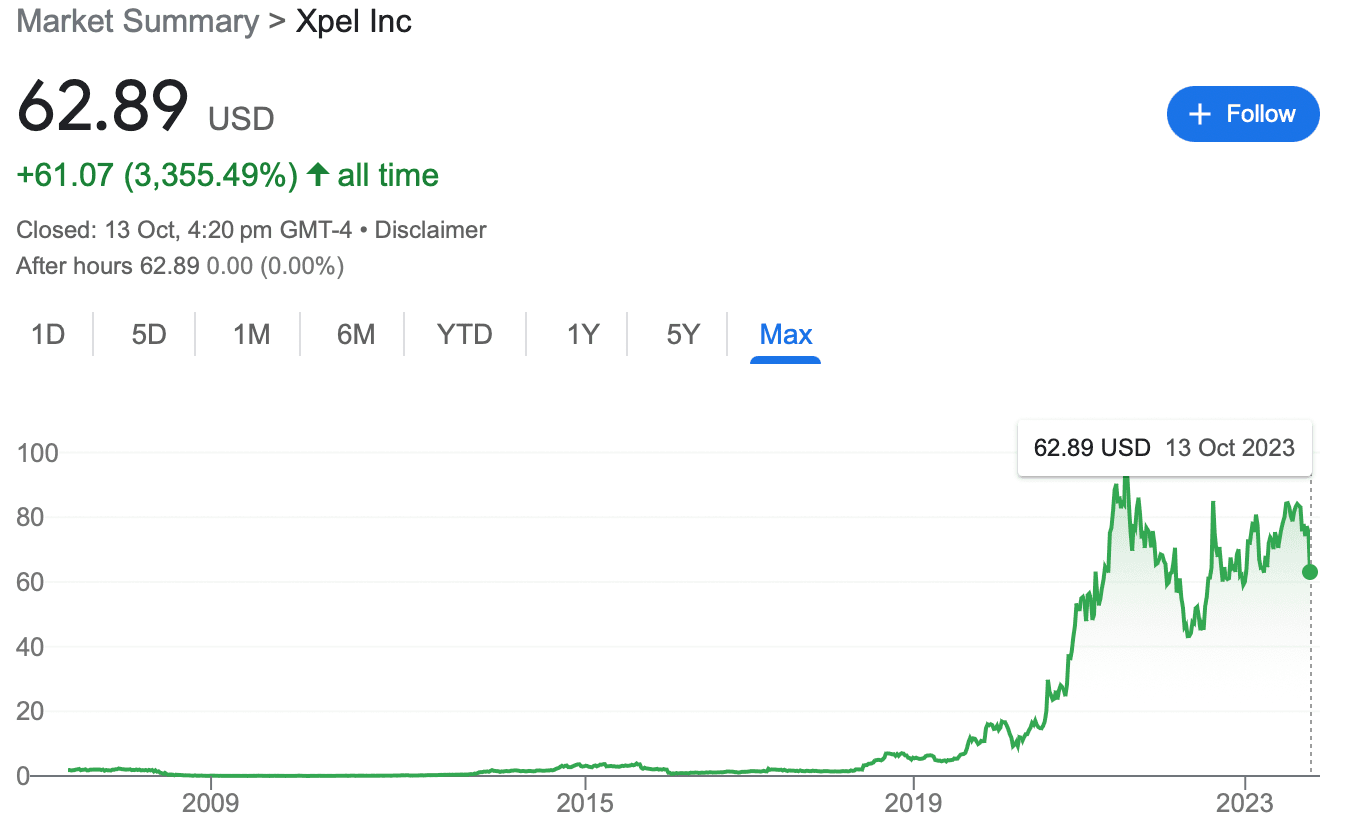Legendary CEO Shares Secrets to 150,000%+ Returns
Simon Turner
Thu 19 Oct 2023 12 minutesIt’s not often the management of companies which outperform in the extreme share the secrets of their success with the investment world at large. When it happens, it pays to sit up and listen. For investors, these conversations provide valuable clues as to how to identify the management teams of future multi-baggers.
On that note, Ryan Pape, the CEO of the US surface protection company XPEL, recently discussed the secrets of his success with Ian Cassel of MicroCapClub. Ryan became XPEL’s CEO in February 2009 when the stock was trading at $0.04. The stock is currently trading at $63 per share, so it’s been a 1500+ bagger over 14 years. During that time shareholder equity has grown over 250x despite only 7% stock dilution. So the lessons shared by Ryan are worthy of note by investors searching for life-changing stocks like XPEL.
What a 1500 bagger looks like
Here’s XPEL’s extraordinary stock chart…

If the question 'how?' runs through your mind when you see a chart like this, below are Ryan Pape’s most insightful quotes from the MicroCapClub interview along with key investor takeaways.
The importance of skin in the game
Ryan expresses his view on skin in the game in no uncertain terms…
‘I think (skin in the game) should be required, particularly when you’re thinking about this microcap realm.’
‘For me, that was the way I would make almost all decisions, was looking at it, say, “Well, what is the best thing for the equity in the company that I own 2, 3, 4, 5 years out?”’
‘7% dilution over that 14 years, well that’s a reflection of that. When you have the investment bankers call and say, “Well, the window’s open here, you probably should put a little cash on the balance sheet. You never know.” And I’d say, “Well, okay, that costs me 5% of my net worth on day one that I have to earn through, so I think we’re not going to do that.”’
‘To get that alignment is absolutely critical. I think it’s mandatory.’
Investor takeaways:
Skin in the game incentivises and aligns management teams to act in shareholder’s best interests in profound ways.
It helps ensure management are thinking long term about building the business.
In general, the more skin in the game the better.
The importance of a shared purpose
The importance of a definite and meaningful purpose was made famous eighty years ago when Think and Grow Rich was published. Ryan highlights it remains as core a tenet of business success now as it did then…
‘By being a public company, we had this shared purpose.’
‘I’d be clear with our team that I’m a large shareholder of the company, but I don’t own the company. I could be gone tomorrow and you could still be here. The company can live on forever. I think that that helped create that shared purpose.’
‘What I would remind our team then, as now, is say, “Anything that you want for yourself that this company could theoretically provide you is predicated upon one thing: that we keep growing and that we do it well. So if you want more responsibility, you want a better job, you want to be paid more, you want to run half of the company, well, any of that can happen with enough growth.”’
‘So there’s huge opportunity for all of them even if they’re not in it from an investor mind-set, but I think that kind of thinking top down makes that possible.’
Investor takeaways:
Shared purpose may be connected with skin in the game for senior management but it can be an incentive in itself for employees if they are offered career opportunities as reward for achieving longer term business goals.
Shared purpose throughout an organisation is empowered and nurtured by management.
Explore 100's of investment opportunities and find your next hidden gem!
Search and compare a purposely broad range of investments and connect directly with product issuers.
Know when to micro-manage & when to delegate
In the politically correct world in which we find ourselves, micro-management often gets a bad rap. However, Ryan makes a powerful point about when to micro-manage and when to delegate…
‘I can’t say I’m a believer in (delegating). I would tell you it’s probably something I struggle with even today.’
‘But I’m very capable and very willing of diving into any detail in any level of the company if I think it’s warranted.’
‘There’s no job that I won’t do in the company if it needs to get done to this day.’
‘I think if my orientation was to be a delegator principally without a willingness to individually contribute, we probably wouldn’t be here today. So I think there’s a time where maybe that changes and pivots.’
Investor takeaways:
Management teams need to understand the detail—this can’t be delegated, particularly when a company is young and emerging.
Inspiring leaders need to be prepared to roll up their sleeves to get their hands dirty.
Delegating becomes more important and pragmatic when a business is larger and more mature.
‘No tomorrow’
Ryan and his team developed a beautifully memorable catch-phrase which encapsulated their burning desire to succeed fast…
‘There’s an urgency that’s required, so we need to get to the right answer on everything as fast as we can.’
‘I think speed is incredibly important. We have this phrase that percolates through our company, no tomorrow, meaning just do it today, don’t wait until tomorrow. I didn’t come up with it, it just happened, and then we’ve adopted it fully.’
‘Still, if there’s one thing that I’m not happy about is that we don’t move fast enough. I think it’s over analysis, it’s fear of failure, and I think we could take two steps forward and one step back, that’s still one step ahead.’
Investor takeaways:
Urgency is at the heart of business growth and success.
The ‘No tomorrow’ psychology ensures a team is moving forward with growing momentum rather than being restrained by over-analysis or the fear of failure which can cripple a business.
The importance of anti-mentors & trusting yourself
Many executives focus on mentors they can learn from, but Ryan makes the profound point that we can often learn more from the mistakes made by anti-mentors…
‘I had over time what I would consider anti-mentors, which are people that I looked up to and thought knew what they were doing until I was proven otherwise.
‘It’s felt like a man on an island in many ways over time. But I think there’s some strength that comes from that too. You’re forced to figure out your own way and figure out what you think is right.’
Investor takeaways:
Anti-mentors can teach managers as much, if not more than, mentors.
Feeling separate/different can be reflective of a uniquely successful management team.
Subscribe to InvestmentMarkets for weekly investment insights and opportunities and get content like this straight into your inbox.
Navigating challenge is a key skillset
Running a company involves being able to navigate challenge on a daily basis. Ryan highlights the importance of understanding the longer term implications of present day challenges…
‘One of the philosophies I have that we joke about internally is your problem of today that’s world-ending is quickly supplanted by a new problem tomorrow. And the world-ending problem of today, once you get to the one tomorrow, you say, “Yeah, that one, don’t worry about it.” It’s just gone.’
‘If we don’t have product to sell today, tomorrow with our customer base we have a real problem. Whereas when you’re faced with something like patent litigation, this is a slow, very slow moving problem.’
Investor takeaways:
All companies face challenges all the time.
Ensuring challenges are prioritised in terms of their potential long-term impact on the business is an essential skillset.
The beauty of being constrained by capital
It’s rare that a smaller company CEO sings the praises of being capital constrained, but Ryan’s thinking about the brevity of leverage is hard to argue with…
‘I believe that having constraints on a business makes it stronger. It’s like if you’re growing tomato plants in your garden, you don’t want to give them too much water, they need a little struggle to be their best, and I think the business is the same way.’
‘One of the things that I’ve learned in seeing our team grow… is that you lose leverage quickly, you lose the incremental return on the incremental person in an organization pretty fast.’
‘So having constraints that say, “Well, we can’t afford to overspend or we can’t afford to have a loss-leading strategy, which says we’re going to light a bunch of money on fire and then eventually make it up, I think there’s an argument it can make the business better.”’
Investor takeaways:
Being constrained by available capital ensures a business remains focused on leveraging improvements using available resources.
The psychology of ‘doing more with less’ helps a business model become stronger.
The importance of profitability
Ryan makes some compelling points about profitability which raise questions about perennially loss-making business models…
‘(Achieving profitability) is super important, and I think in most cases it probably can be done a lot faster than people do it.’
‘They kind of take license that, hey, it’s okay to lose money for a while because in the end it’s going to be worth it.
‘I think that if you… put more constraints on the business and the spending, you might end up with a better business model as a result. In our case, we ended up with the highest ASP in the business, and that remains today in part because of the constraints and how we had to operate then.’
Investor takeaways:
There’s no valid excuse to delay achieving profitability based upon a ‘jam tomorrow’ mentality.
The sooner companies achieve profitability, the more focused they tend to be on the drivers of long term success—like product quality.
The role of luck vs execution
The role of luck is rarely talked about in investment circles so it’s refreshing to hear Ryan’s honest acceptance that it plays a significant role…
‘I think luck is a huge part of all success.’
‘You have decisions you take, which could be good or bad, and then those are compounded by what happens to you, the luck factor, and then you’re in this cycle that repeats.’
‘But there’s no question, part of our success is that we were the right company with the right brand, with the right product at the right time. We created a category, we were the niche that needed to be developed at the time.’
Investor takeaways:
Luck is a significant part of all business success.
Companies can position themselves to be lucky by having the right product at the right time, creating a new product category that meets an unmet need, and executing well.
Fail fast
Failing fast has become a mainstream management philosophy which Ryan agrees with…
‘Fail fast. I mean, we could take a decision today, and if it ends up being the wrong decision, we can change it.’
‘A lot of the decisions, the consequence of being wrong, it’s just not that important. It might cost you a little bit of money to fix it, it might mean you have to do some clean-up on the other aisle to fix it, but the consequences are so low to being wrong in the decision that the inaction is far more detrimental.’
Investor takeaways:
Most failed business decisions can be addressed for minimal cost if there’s a culture of accepting failure fast.
Not only does this save money, it allows a business to quickly pivot toward more successful iterations of early ideas.
Under-promise and over-deliver to financial markets
Ryan calls a spade a spade, and believes all management teams should focus on over-delivering versus expectations…
‘One of the things that struck me years ago… is frankly the amount of bullshit you heard from a lot of people on my side. I would look at some of it and think, “This is obviously ridiculous.”’
‘What I tried to project then and now as I’m talking to investors is to be pragmatic, realistic, acknowledge the strengths and weaknesses of the business, say things that I know we can do, not pin my hopes on something that hasn’t happened yet...’
Investor takeaways:
Successful management teams under-promise and over-deliver.
They communicate prudently and responsibly to build their long term reputation in financial markets.
Learning from those who’ve been there done that
Thanks to Ryan Pape for sharing his words of wisdom with the investment world via the MicroCapClub interview.
Finding the next 1500+ bagger will largely come down to finding a management team with a similar winning mind-set combined with the right product at the right time. Ryan’s valuable insights into the pragmatic and inspiring mind-set of a management team who’ve created legendary wealth for their investors may help steer you toward an emerging company with a similarly bright future.
Disclaimer: This article is prepared by Simon Turner. It is for educational purposes only. While all reasonable care has been taken by the author in the preparation of this information, the author and InvestmentMarkets (Aust) Pty. Ltd. as publisher take no responsibility for any actions taken based on information contained herein or for any errors or omissions within it. Interested parties should seek independent professional advice prior to acting on any information presented. Please note past performance is not a reliable indicator of future performance.







